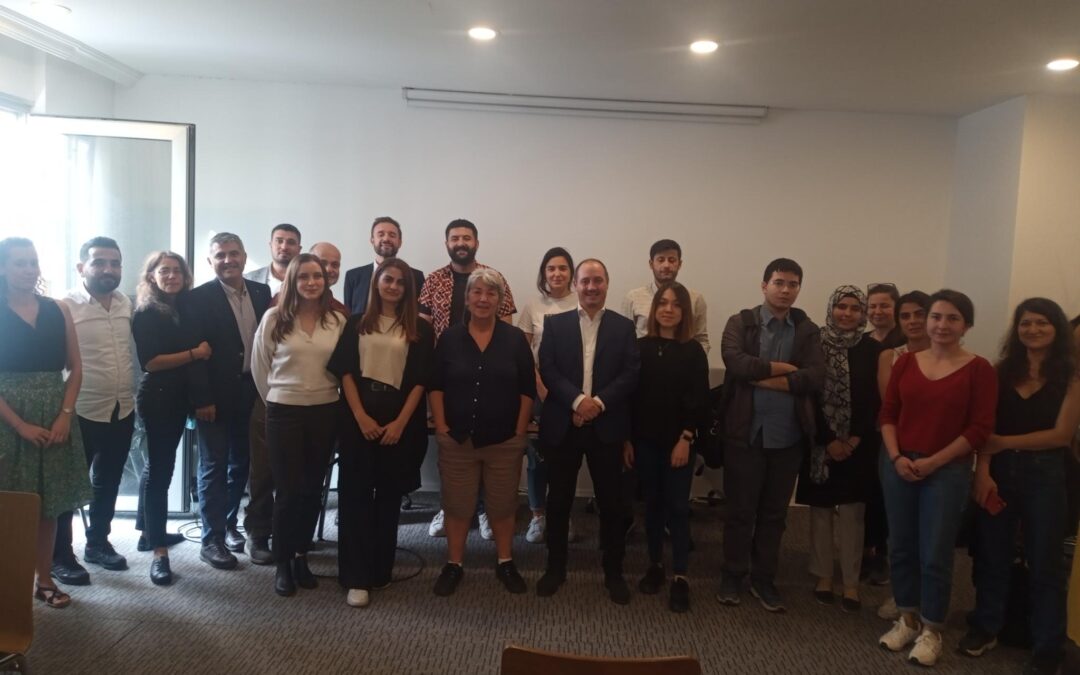
Oct 16, 2022 | Agendas, Events, News
The ICJ, together with KAGED and the Human Rights Joint Platform has held a series of four trainings for lawyers and civil society in Türkiye to empower them in using human rights law to protect the environment.
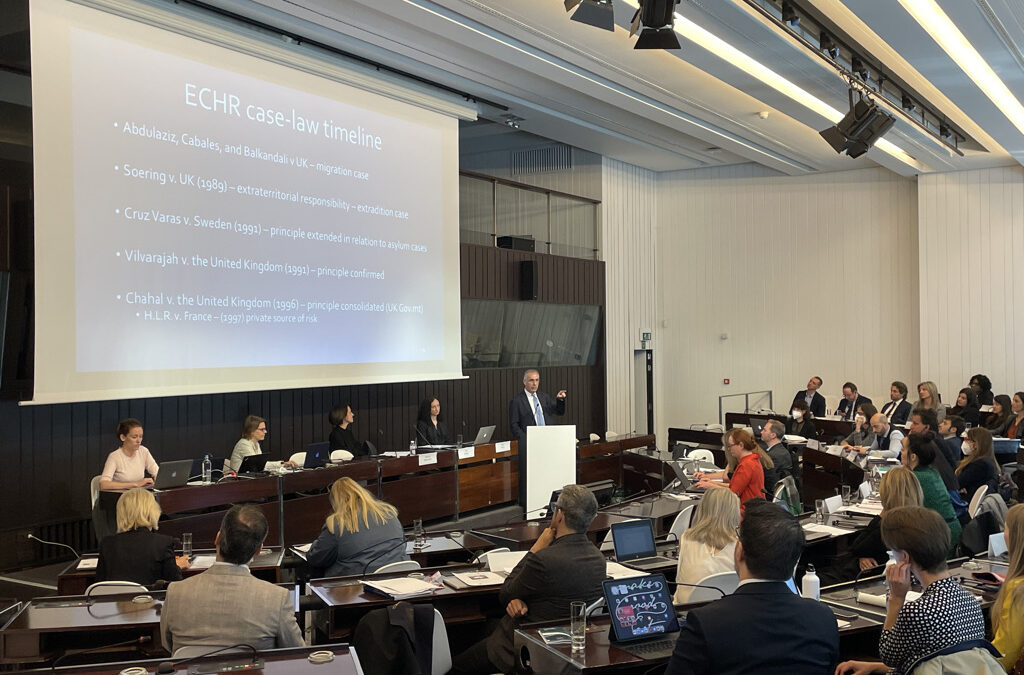
May 4, 2022 | Agendas, Events, News
During the International Roundtable on the Rights of Migrants and Refugees in the European Union, held by the International Commission of Jurists (ICJ) and its partner organizations Immigration Council of Ireland, Scuola Superiore Sant’Anna, the Greek Council for Refugees and Forum for Human Rights, judges, lawyers, experts and NGO representatives from Italy, Greece, the Czech Republic and Ireland came together to discuss the challenges involved in safeguarding the rights of migrants and refugees in the EU.
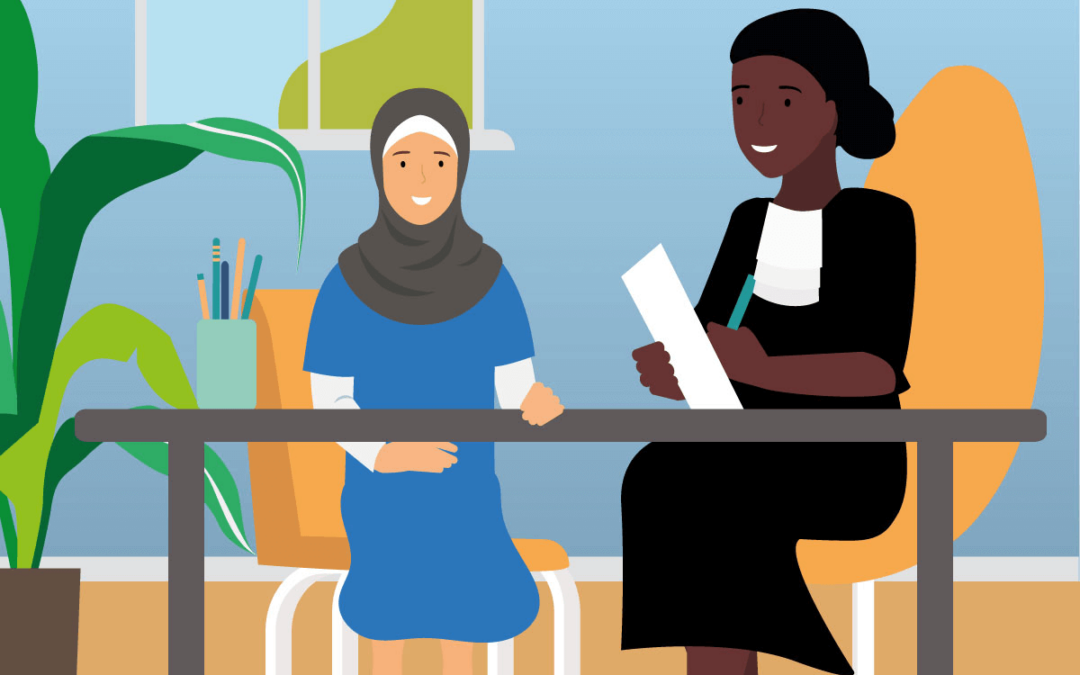
Mar 17, 2022 | Agendas, Events, News, Video clips
Immigration detention of children is unlawful according to international law and States are obliged to implement alternatives to detention. One of the best solutions for unaccompanied children is their placement into mainstream child protection systems, which already works well in some countries in the EU, an ICJ webinar was told.
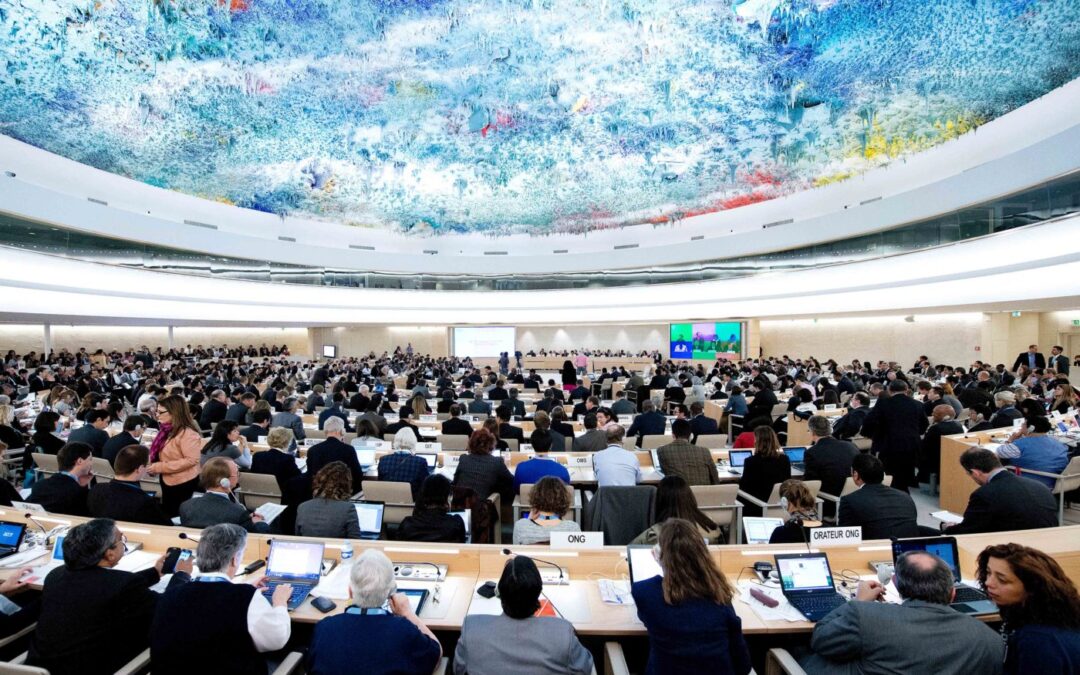
Jun 24, 2021 | Agendas, Events, News
On Friday 2 July, the ICJ, alongside IBAHRI, OHCHR and other partners, organize an online event to launch the report of the UN Special Rapporteur on the rights to freedom of peaceful assembly and of association: “Access to justice as an integral element of the protection of the right to freedom of peaceful assembly”.
This side event aims to bring together the UN Special Rapporteur, civil society representatives, UN bodies and State representatives to discuss their intersecting roles in promoting access to justice as an integral element of the protection of rights to freedom of peaceful assembly. The event will further examine specific challenges related to access to justice in relation to peaceful assemblies. Finally, it will expand on the important role of lawyers in the context of peaceful assemblies.
The event will also examine how the mandate of the UN Special Rapporteur can address impunity for violations of the right to freedom of peaceful assembly; explore how the international human rights community can support the work of national legal networks to protect and promote the right to freedom of peaceful assembly; and, discuss practical measures necessary to follow up the reports recommendations.
Format: The side event will be held online with experts from civil society, state and UN bodies. Space will be provided for interactions with participants from the floor.
Date: 2 July 2021 – 47th UN Human Rights Council Session
Time: 14:00-15:30 Geneva, Switzerland
Language: English, French and Spanish Translation will be provided
Panelists:
- Clement Voule, UN Special Rapporteur on the Rights to Freedom of Peaceful Assembly and of Association
- Jomary Ortegon, Colectivo de Abogadxs José Alvear Restrepo (CAJAR), Colombia
- Alana Greer, Community Justice Project, USA
- Femi Falana SAN, Human Rights lawyer, Nigeria
- Human Rights Lawyer, Belarus
Moderator: Baroness H. Kennedy QC
Register here.
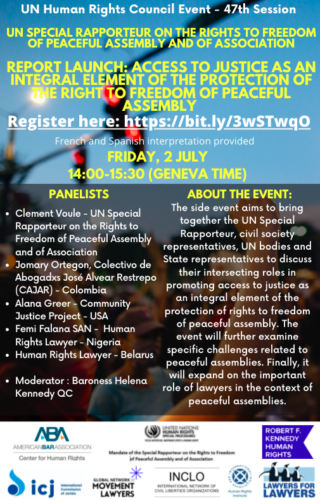
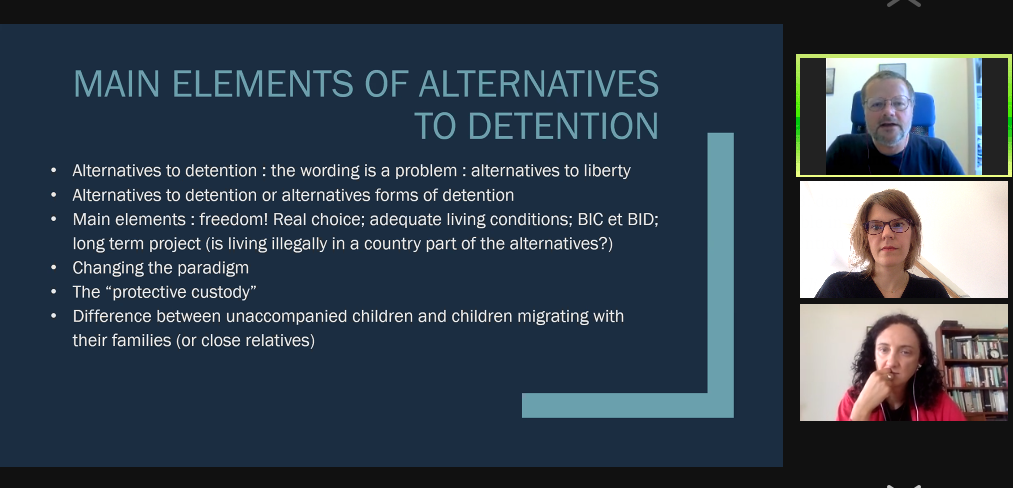
Jun 21, 2021 | Agendas, Events, News
Children should never be detained in immigration context. Immigration detention of children is never in their best interests and is not justifiable, said experts during a transnational workshop on Alternatives to detention vs. alternative forms of detention of migrant children held by the International Commission of Jurists (ICJ) and partners on June 17 and 18.
“Instead of detaining children, case management should be used instead, and a community assistance and placement model should be used for families and children as an effective alternative to detention. Unaccompanied children should be placed within the mainstream care system,” Karolína Babická, legal adviser at the ICJ said.
During the workshop experts and practitioners from seven EU countries and international experts explored good and bad practices of alternatives to detention. In particular, the principle of the ‘best interests of the child’ was discussed as well as procedures for age assessment, and specific alternative arrangements for the care of children in migration, such as the return houses in Belgium, and regular reporting.
The group further explored ways to include unaccompanied migrant children in the mainstream child-care system rather than under the management of immigration authorities. The case-management and community placement model by the International Detention Coalition (IDC) was discussed in detail.
It was agreed that children must have access to procedural rights, including the right to be heard and to participate, access to information and to legal assistance and legal aid, access to interpretation, effective remedy and a guardian. Best interest of the child assessments as well as age assessment must be done through a rights-based approach, following child-friendly procedures and safeguards.
Any alternatives to detention applied by states should be monitored and regularly evaluated to ensure these do not constitute alternative forms of detention.
The workshop took place as part of the CADRE project and will be followed by second and third workshop as well as by on-line conferences and national trainings during the second year of duration of the project.
See the agenda here: Agenda CADRE Transnational workshop_17-18 June_final
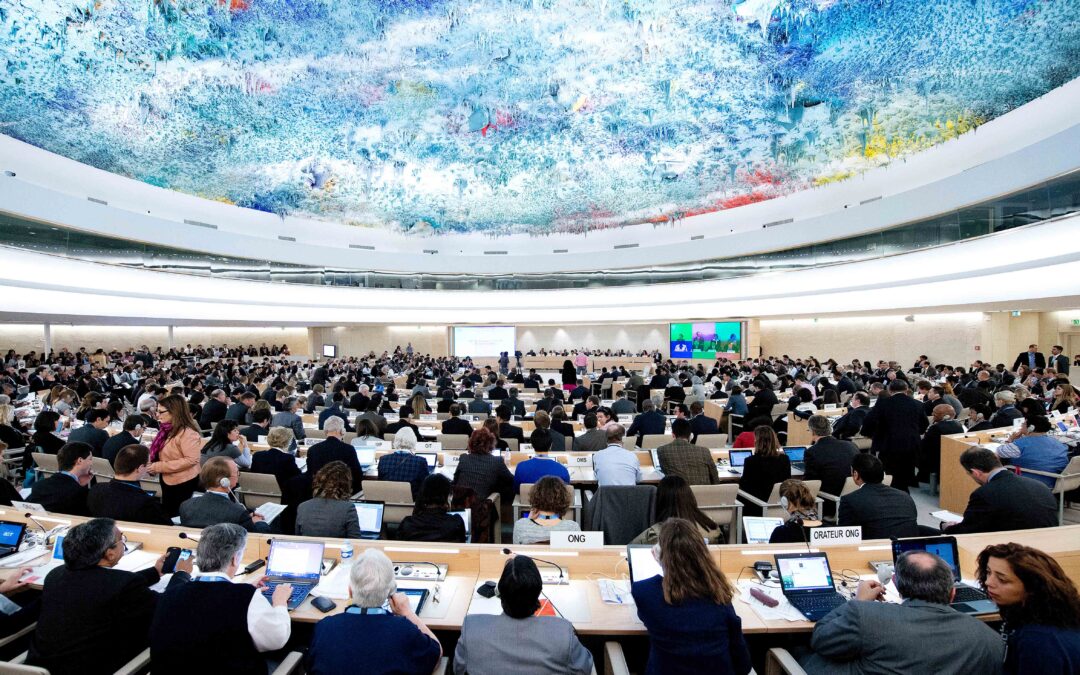
Jun 18, 2021 | Agendas, Events, News
On 22 June, the ICJ, Human Rights Watch, the Cairo Institute for Human Rights Studies, the Center for Reproductive Rights and the International Planned Parenthood Federation, with the co-sponsorship of the Kingdom of Spain, organize an online event on the 10th anniversary of the Council of Europe’s Convention on preventing and combating violence against women and domestic violence (Istanbul Convention).
This side event at the margin of the 47th regular session of the UN Human Rights Council has convened expert speakers to illustrate the situation of human rights protection to combat and prevent violence against women in Europe, how the Istanbul Convention has crucially contributed to this goal and the obstacles to its effective implementation.
Preventing and combating violence against women, as well as its causes and consequences, are a priority of the UN Human Rights Council. While UN standards are central to achieving this goal, regional standards have to date provided a key contribution in this field. The Council of Europe’s Istanbul Convention is the most far-reaching international treaty specifically designed to counter violence against women.
On 11 May 2021, the Istanbul Convention turned 10 years old. It is now time to take stock of the achievements that this Convention has contributed to as well as the challenges ahead, including countering the spread of misinformation about the Convention and ensuring states continue to champion its principles and standards.
Women and girls are still suffering the aftermaths of the COVID-19 crisis. The pandemic effects have shown a worrying increase on violence against women. The universalization of the Istanbul Convention is more important than ever because the pandemic has unveiled the “permanent shadow pandemic” that women and girls are suffering around the world.
When: Tuesday June 22nd, 13:00 – 14:00 CEST
Where: Zoom
Language: English
Panelists
- María Isabel Sanchís, Senior Advisor, Office of the Commissioner on Violence against Women of the Government of Spain
- Dubravka Šimonović, UN Special Rapporteur on violence against women, its causes and consequences
- Dame Silvia Cartwright, former Governor General of New Zealand, former CEDAW member, Commissioner of the International Commission of Jurists
- Professor Feride Acar, former chairwoman of CEDAW and GREVIO
- Hillary Margolis, Senior Researcher, Women’s Rights Division, Human Rights Watch
Moderator Massimo Frigo, UN Representative, ICJ
To confirm your participation and receive connection details, please RSVP to Massimo Frigo, email: Massimo.Frigo@icj.org .
Event-Invitation-Side Event-IstanbulConvention-UN-HRC47-final-2021-eng (download the event leaflet)












